Note 1: This article was written in collaboration with Benjamin Porthault who did all the statistical analysis. When he is not running Python Scripts, Benjamin works as a performance/mental coach specializing in coaching chess players. Benjamin has experience coaching the English national team, among others. I highly recommend checking his website Mindcreaser.com and/or his Substack. He can be also found on Twitter.
Note 2: This article assumes that the reader has a basic familiarity with chess titles and norms. If this whole topic is a big ‘terra incognita’ for you – I suggest reading my previous article focusing exclusively on the norms and title system. Or reading about it elsewhere.
Note 3: The first half of the article will talk about the concept of Round-Robin Chess Norm Events in some detail. If you are familiar with what they are and what purpose they serve, I suggest you skip directly to the „The Problem(s) With Round-Robin Chess Norm Events“ section of the article, where the real „meat“ begins.
Table of Contents
Introduction
About FIDE Titles
Obtaining a chess title is one of the greatest accomplishments one can achieve within the chess world. 1 Many chess players obsessively study night and day primarily motivated by the hope of seeing a few letters in front of their name on the starting list of one of their future tournaments.
Obtaining any chess title is also a very difficult and challenging endeavor. 2 Only a very low percentage of all chess players actually manages to achieve one. Many players devote countless years to pursuing a desired title before obtaining it. And many others fall short without ever conquering that final barrier.
On the other hand, there is no denying that not all titles are equally difficult to achieve. There is a sentiment within the chess world in regard to the Candidate Master title, which is regarded by many as „not a real title“. 3 Some even share the same sentiment about the FIDE Master title. Not to mention the abysmal opinion of an average chess player about the female titles. 4
Irrespective of whether you share these sentiments or not – there is no denying that achieving the titles of International Master and Grandmaster (and consequently -Women International Master and Women Grandmaster) is the most difficult of it all. Not only do these titles require a higher rating than others to achieve them. But they also have a very demanding and challenging prerequisite for achieving them.
Title norms.
About FIDE Title Norm Prerequisites
In order to obtain the IM, GM, WIM or WGM title, a player – apart from reaching the minimum required rating – also needs to obtain three norms. 5 A norm refers to a successful performance in a chess tournament that meets the requirements for the norm’s fulfillment.
In order for a performance to be eligible for a norm, three criteria have to be met/evaluated: 6
Rating performance – A player has to achieve a predetermined rating performance during a single event in order to gain a norm for a specific title. This rating performance is higher than the minimum required rating for the given norm. For instance, the rating performance prerequisite for the GM norm is 2600, even though the minimum required rating to obtain the GM title is 2500.
Federation of opponents – A certain number of opponents has to belong to different national chess associations than the player going after the norm. 7
Titles of opponents – A certain number of opponents has to have a specific FIDE title of their own.
The norm system is what makes achieving the titles of IM, GM, WIM or WGM so difficult. For many players, they represent a major obstacle. It is not uncommon for a player to be rated well above 2400 or 2500 FIDE 8 and lack one or more norms required for the desired title. 9
Aside from the objective difficulty of having to perform at a very high level, part of the reason that achieving a norm is, to a certain degree, luck-dependent. All three criteria envision that you get just the right opposition throughout a specific chess event.
Players with sufficiently high ratings to ensure you can get the right performance.
Players from different federations.
Enough players with the FIDE title.
Thus, even if you play out of your mind, you can still miss out on a norm purely due to the things that are outside of your control. There are countless stories of players getting unlucky with the pairing in the last round of a big tournament and missing out on a specific norm. Not to mention all the stories where people do get the right pairing but then their opponent indulges in a disgusting practice of not appearing in the game – which also ruins the norm chances. 10
Thus, achieving a norm in regular chess Swiss Open tournaments is extremely challenging and luck-dependent. However, most chess tournaments are held using precisely this system. True, there are specific events such as the Chess Olympiad, stronger opens such as FIDE Grand Swiss, or national leagues where the likelihood of scoring a norm is increased. But these events are few and far between. And are not equally accessible to all potential norm seekers.
Thus, it is clear there is a place in the chess world for regular events with increased chances of scoring a norm for a specific title. Which brings me to the central topic of this article.
Round-Robin Chess Norm Events.
Round-Robin Chess Norm Events
About Round-Robin Chess Norm Events. The Motivation For This Article.
Norm events are chess tournaments whose sole purpose is to provide the players with an opportunity/increased chance to score a norm for a specific title. This is done by ensuring that the opposition a title seeker faces in a tournament meets the criteria for a specific title. These tournaments ensure that:
- the average rating of the tournament is above a certain threshold, which ensures that the participants can easily achieve the required rating performance. 11
- the number of players from different federations will be sufficient for the norm
- the number of titled players will be sufficient for the norm
This is easiest to achieve in a (semi)closed setting with a limited amount of players. This is why the vast majority of norm events are held using the so-called round-robin – or all-play-all system.12
Most commonly, these tournaments have 9 rounds 13 and consist of a mixed field of 10 players. The organizers of these tournaments typically invite a number of „title holders“ – titled players (most commonly 3) from different federations. The rest of the field consists of players seeking to score a norm. The rating of these „title seekers“ is usually also restricted to a certain minimum threshold, so that the average rating of the tournament remains sufficiently high.
Under those circumstances, it is fairly easy to ensure that the minimum rating, number of titled players, and players from different federations are sufficient to guarantee a norm for those who perform successfully.
A typical starting list of a Norm event. Source: Zadar GM Norm Tournament, chess results
Now, all this sounds very nice and beneficial in theory. There is no denying that there is a need for such events within the chess world, given how difficult it is to score norms.
However, in practice, many such events seem to be marred with numerous problems. There are many shady practices and suspicious things happening „under the surface“. Many people in the chess world question their legitimacy, refer to these tournaments as „norm“ factories or even go as far as calling some of them „fake tournaments“. 14
A private message I received from a strong (2600+) Grandmaster after openly criticizing these events on my Twitter
Every now and then, a lengthy discussion about round-robin norm events seems to emerge within the chess world. Most commonly after a shattering, record-breaking performance by a very talented young player. The most notable example includes the case of the youngest-ever GM Abhimanyu Mishra. His scoring all three norms in round-robin norm events in Budapest prompted a reaction from the World Championship Challenger Ian Nepomniachtchi. This led to a prolonged discussion and a series of articles on chess.com and even the New York Times, where many problematic aspects of these events were tackled.
I myself have been pretty vocal about issues surrounding these events on Twitter. I first expressed my opinion after American youngster Andy Woodward made some astounding results in round-robin events in Serbia. More recently, I also wrote about this issue after 9-year-old Faustino Oro made a sensational record-breaking norm in a round-robin even in Argentina. Finally, just a couple of days ago, I tweeted in a very sarcastic manner about the success of a Singaporean teenager in a closed round-robin event in Budapest.
This last tweet, in particular, led to a very heated – yet ultimately unproductive debate. In retrospect, this is not surprising given that my reaction was very poor and not very constructive. I don’t think being sarcastic on social media is necessarily a good way of bringing light to an issue. Or starting a constructive conversation about it.
This made me realize I should probably do a better job of explaining my reasoning and arguments. I also figured I should act in a more constructive manner rather than purely mock and criticize.
Thus, in the rest of this article, I will explain why exactly I find some of these events so problematic. And then try to come up with prospective solutions and ways of improving the situation related to these tournaments.
As well as the title and norm system as a whole.
The Problem(s) With Round-Robin Chess Norm Events?
Excessive Amount Of Quick Draws
If you have read any of my Tweets, you probably know that one of my main complaints about Round-Robin Chess Norm Events is that many games end in quick draws. For example, in the most recent one, a big discussion revolved around this particular 10-move draw:
Kaczur Florian – Siddharth, Jagadeesh, 2nd round, Vezerkepzo September GM 2023
On the basis of anecdotal evidence and limited data size, I was under the impression that this number is significantly higher than in regular Swiss/Open tournaments. For this article, I decided to test this hypothesis with the help of Benjamin Porthault. He did a statistical analysis of games from a total of 13 round-robin events and compared their average duration (number of moves) with games from a total of 2 Open/Swiss events. The Round-Robin events featured in the analysis were as follows: 15
- Kecksemet Caissa 04 1993
- First Saturday GM 2009
- Charlotte GM Invitational 2016
- Kecksemet Caissa 2016
- CCCSA GM A 2021
- CCCSA GM B 2021
- MNE CHess June 2022
- Hamburg 2022 Chess Club GM Invitational
- Third Saturday Mix 266
- Third Saturday Mix 271
- Fredericia 2019
- Vezerkepzo-GM-2023
- First Saturday GM May 2021
while the open events selected were:
When selecting a data set, I tried to choose norm events from different years and countries, such as Hungary, Serbia, Germany, and the USA. As for the Open events, I have decided to select one featuring more higher-rated players (Qatar Masters) and one massive one, featuring more players of all rating ranges (Aeroflot Open). Also, given that an average Open features more games (and more moves), I figured selecting a small sampler size in that case would be justified.
The results of the analysis were quite interesting:
Diagram #1: Comparison of the average game duration between an Open event and a Norm event
In the graph above we can see two histograms. The blue one displays an average Move Count (length of the game) in an Open event, while the orange one displays an average Move Count in a Round-Robin Norm Event.
It is quite obvious that there is something weird going on in the selected Norm Events. While an average game in an Open event lasts around 30-40 „moves“, an average game in a Norm Event lasts either 10-15 moves (the first left peak of the orange graph) or again 30-40 moves, just like games in Open events.
The explanation is simple. The left peak of the orange histogram is there because so many games in Norm events end in quick draws, while the right peak shows those games where the players do actually play normally. The fact that this graph is so fundamentally different from the one for Open events demonstrates that there is something to the original hypothesis. That, on average, there are more short games/quick draws in Norm events compared to the Open events.
With that being said, not all Norm events are equally bad in that regard. Since one of the points I am trying to convey in this article is that there are legitimate Norm events, I asked Benjamin to plot histograms depicting the distribution of Move Count for every individual event. The results for the 13 selected tournaments can be found in the images below:
Diagram #2: Average Duration of the game (Move Count vs. number of games) for 13 Round-Robin events
From the diagrams above, we can conclude the following:
- two tournaments held in Western Europe (Federicia, Hamburg) had an extremely low amount of quick draws/games below 20 moves
- most tournaments held in Eastern Europe, such as Vezerkepzo GM, Kecskemet Caissa, and Third Saturday Mix had extremely high amounts of quick draws
- the only notable exception is the First Saturday GM May 2021 tournament. This possibly demonstrates that the invited field has as much to do with the „fighting spirit“ displayed in the tournament as the tournament name.
- This is further confirmed by the plots for the tournaments held in Charlotte. It was interesting to observe the difference between Charlotte CCCSA GM Tournament 2016 and CCCSA Summer GM A and B tournaments held in 2021. The former featured much more quick draws than the latter two. Which probably once again had to do with the field that was invited.
Now, there are two counter-arguments I can imagine attentive readers bringing up at this point. The first one is related to the size and the type of the data set used in the analysis. That the amount of tournaments is simply too small and not varied enough for it to count as anything more as „anecdotal evidence“ backed up with some data.
It is definitely a good point. There is no denying that the data set used is very limited. I fully agree this is a somewhat superficial and „quick“ analysis. That a much more comprehensive approach would be very much welcome.
However, I think analysis is sufficient for the purpose of this article. Our main goal was to provide a qualitative/illustrative picture and back it up with a number of concrete examples. I fully agree that a more comprehensive analysis including a much larger sample size is welcome. Or even required! 16Although I suspect the graphs above wouldn’t look too different even if you included a more varied/bigger tournament sample.
The second complaint I can imagine people having refers to the topic of quick draws. I am sure many might say that they don’t see the problem even if the data presented above is 100% correct. That they are completely legitimate and in accordance with the rules of the game.
I do admit that I have a pretty hardcore attitude toward them in general. I consider them one of the most harmful practices within the chess world that I wish were abolished. Part of the problem is that the word „quick draw“ is often equivalent to „pre-arranged draw“. In my world, this is equivalent to match-fixing. I will write about this aspect slightly later in the article.
But before that, let me focus on the main reason why I consider quick draws such a big problem in certain Round-Robin tournaments.
The basic economics of these events.
Economics according to which „title holders“ in these events get paid to play before the event even begins. With the money raised from the participation fees of „title seekers“.
This yields me to the next point.
The „Business“ Side of the Round-Robin Norm Events. The Conflict Of Interest
Previously in the article, I have already described how the playing field of a round-robin norm event usually consists of „title holders“, who are there to ensure that the norms can be achieved. And „title seekers“, who are there to try and get the norms.
What I didn’t mention is that very often, „title holders“ get compensated for their participation in advance, PRIOR TO the tournament. The amount of the compensation and the exact model are almost never publicly available. But from what I have heard, it most commonly boils down to a flat fee and is in no shape or form, tied to the titled player’s performance in the tournament.
Where does this money come from? Very often, the main income source is „title seekers“. Every player who wishes to participate and play for the norm has to pay an entry fee. These fees are quite substantial and much higher than in regular Open events. As an example, take a look at the propositions available at the organizer of the Vezerkepzo tournament in Hungary: 17
Info from tournament organizer Vezerkepzo
This „distribution of wealth“ leads to a very curious situation where part of the playing field is motivated to try and play their best. While the rest doesn’t have nearly the same incentive. Which is why the vast majority of the quick draws happen precisely in games featuring „title holders“.
This is not just a superficial impression. In his statistical analysis, Benjamin also analyzed the average duration of a chess game for every individual participant in the above 13 tournaments. The results can be found in the table below:
Participants in the above-mentioned 13 round-robin norm events ordered based on the amount of short draws featured in their games. Note that for the purposes of the analysis, every game that lasted less than 20 games was characterized as a Short Draw. Also note that different events had different number of rounds (9, 10, 11 or 13). Finally – note that this list contains only the „worst“ offenders in terms of short draws – not all the participants in every single tournament from the list above.
It can be seen from the table above that certain players, such as GM Czebe Attila, GM Alexander Kovchan, GM Siniša Dražić, GM Tanguy Ringoir or GM Andrei Kovalev, drew a large percentage of games they played in events considered. 18
Of course, doing this against lower-level, untitled opposition, most of the time comes at the cost of the rating. It is not uncommon to see some of the „titled holders“ drop their ratings significantly by participating in these events.
For example, the aforementioned GM Alexander Kovchan dropped almost 80 rating points in 2022 by participating in 8 (!!) consecutive (!!) GM round-robin events:
- 10 points in March 2022
- 90 points in April 2022
- 70 points in May 2022
- 50 points in June 2022
- 40 points in July 2022
Source: Alexander Kovchan’s FIDE profile
Something similar can be observed in the case of GM Andrei Kovalev. Since November 2021, when he was rated 2501, he lost 66 rating points – almost exclusively by playing in round-robin norm events.
Kovalev’s calculations for December 2021, when it all started
Of course, not everyone is willing to simply shed their rating like this, irrespective of financial incentives. This is why more often than not, invited title holders are players who are past their prime. There is an ongoing notion that participants in many norm events are „washed-out GMs“. It is not a coincidence that Nepo used the „2400 GM luminaries“ phrasing in his controversial tweet.
Some people will make an argument that this is a perfectly acceptable state of affairs. That it is perfectly reasonable for such GMs to have a relatively stable income source: For example, during our prolonged discussion, GM Kevin Goh from Singapore stated that:
“many GMs especially in Eastern Europe are having a hard time finding a good way to make income. I am referring to the sub 2400 to say 2480 range of GMs who might be struggling to get students and simply have no chances to win prizes at open tournaments. Such events offer them some stable income”
To be honest, I really don’t understand why this view that „old GMs have the right to make a living via these tournaments“ is so deeply established within the chess world. The notion that „I once achieved a title so I have a right to make money by playing“ strikes me as very entitled. Especially in this day and age where the chess world is booming and providing numerous opportunities.
In my mind, getting paid to give quick draws and ensure that other players get their norm and titles is a clean-cut case of unethical money-making in chess. I feel it is a clear case of a massive conflict of interests.
Especially since there are instances where these titled players are at the same time the organizers of these events. For example, it is well-known that certain tournaments in Serbia are organized by GM Siniša Dražić. While the Vezerkepzo series in Hungary is organized by GM Czebe Atilla.
Both of these names were present at the top of the list of players who make the most quick draws. It is also noteworthy that Siniša Dražić currently has a rating below 2300, while Czebe Atilla is also significantly far from the GM mark of 2500 ELO. If there was ever a blatant example of someone being in a massive conflict of interest – here is one.
To be fair, to a large extent, this is true for many organizers of these events. Many of them view the organization of these tournaments purely as a business opportunity. Even a respectable organizer such as Charlotte Chess Club states on their website that they are an „Industry leader in Norm Tournaments“. 19
Of course, the main „product“ of the business is norm scoring. If this didn’t happen, the tournament would quickly become notorious for that, which would be very bad for the business. This creates a unique situation where all three sides: title seekers, title holders, and organizers have something to lose:
- title seekers might miss the opportunity to score a norm
- title holders might not get invited to the next event and lose a source of income
- organizers might get less interest in their Norm event, which means less income from participation fees in the future
This state of affairs was summarized by strong Azeri grandmaster Vasif Durarbayli:
First and foremost, your primary ‘product’ is the ‘title norm.’ Your main objective should be to create an environment conducive to players achieving these norms. Think about it: how long would a tournament last if no one managed to earn a title for several years?
Therefore, you should aim to invite non-ambitious titled players—those who aren’t particularly concerned with their ratings and won’t use all their energy trying to beat a more motivated title-seeking opponent. In such an environment, the odds of earning a norm increase significantly.
Next, avoid offering prize money, as this can overly motivate titled players and undermine your primary objective. Most norm tournaments sidestep this issue by providing fixed compensation to invited players. Last, but not least, aim for the lowest possible rating average to make the title more attainable.
With these factors in place, earning a norm becomes substantially easier than in a more conventionally structured closed tournament where prize money is a factor.
In conclusion, invited players, being aware of these unspoken rules, are more inclined to make short draws. This not only helps other players but also ensures they’ll be invited back for future events. It’s worth noting that only a minority of titled players consider short draws, even pre-arranged draws to be a significant issue.
Match Fixing
As far as I am concerned, even if the concerns raised above were the only issue of round-robin norm events, I would already find them problematic.
However, it gets even worse. Very often, these tournaments are the subject of very suspicious results and outright match-fixing. I have already raised this issue in the section about quick draws. Because in practice, many of them are actually pre-arranged (arranged before the game starts). 20
Alas, it does not end with (quick) draws. Quite often, games with decisive results – or even entire tournaments, are fixed. In certain cases, there were doubts about whether a tournament whose results were submitted to FIDE had ever been played, to begin with.
Historically speaking, this is not exactly a fresh topic. There are quite a few very famous cases of tournaments/players where foul play was severely suspected. One of the most notable examples is the infamous tournament held in Strumica, Macedonia 1995. It was heavily suspected that this quadruple round-robin (!!) was fixed in favor of the current president of the ECU and one of Kasparov’s former seconds, GM Zurab Azmaiparashvili, who scored an outstanding 16/18 (!!!).
Source: ECU President Azmaiparashvili Mentions Cheating, Then Apologizes
Even more infamous – and egregious – examples of match-fixing was the case of the Romanian „Grandmaster“ Alexandru Crisan. He basically faked his way all the way up to 2635 FIDE/33rd place in the world almost exclusively by submitting very „convincing“ results from some fictive tournaments.
Even though none of it technically has to do with round-robin norm events, it is worth noting that the core issue here was the closed nature of the tournaments. Put simply – it is much easier to commit foul play in tournaments with a limited amount of participants (and limited exposure). Especially if the participants in these events know each other very well, as is often the case in Norm events held in the Balkans or Eastern Europe. 21
Besides, one doesn’t have to search too long to find suspicious round-robin norm events, too. When I was doing my research article, I stumbled on the following article all the way back from 2005 related to the tournament „Heroes of Chernobyl“ that seemingly never happened. As well as on this article, related to the tournament held in Alushta, also in 2005, whose legitimacy was severely questioned. 22
In recent times, there have also been quite a few of these tournaments that have raised some suspicion. For example, quite a few people have dissected the tournaments and games where the popular streamer Nemo Zhou made her WGM norms. I also remember watching a very disturbing video by CM Sahil Tickoo where he describes how he was threatened by the organizer due to his unwillingness to fix games. 23 The following Reddit thread is also very illuminating in that regard.
Another very notable example that I want to point out is the case of IM Bojan Jovanović. In September 2019, Bojan participated in two back-to-back round-robin norm events in Serbia, titled Narcis 1 and Narcis 5, winning 95 rating points and achieving two back-to-back IM norms.
Source: Bojan Jovanović’s FIDE Profile
There is heavy suspicion that these events were filled with foul play and match-fixing. FIDE’s Ethics and Disciplinary Commission conducted a very thorough investigation at the request of the FIDE’s Fair Play Commission:
The IP concluded that FM Jovanovic violated the Ethics Code (“the Code”), through match-fixing in two tournaments of the “Narcis” tournament series in Divcibare in September and October 2018. They further concluded that Mr. Jovic violated the Code by organizing the “Narcis” tournament series in Divcibare in September and October 2018 for the purpose of enabling selected participants to achieve player norms through match-fixing. The FPL recommended Mr. Jovanovic be banned for 4 years, his rating reset to 2270 and all norms achieved during 2018, 2019, and 2020 be annulled. For Mr. Jovic, FPL recommended a prohibition on organizing FIDE tournaments for 5 years. 24
Alas, despite a clear indication that something was „off“, nothing could have been proven and FPL’s request to annul the results of these tournaments was ultimately rejected: 25
Organizing a Swiss League of 14 players only, immediately next day after a round robin was also done so that norm holders complete the FIDE requirement of playing in a Swiss League, but a 14 players Swiss League is an unheard of event and has brought the game of chess to disrepute.
As noted by the IP in its report: “Immediately afterwards Mr. Jovanovic played a Swiss system tournament (“Narcis 5”-30.09.-08.10. in the afternoon), which he won with 7.0 points and achieved another IM norm. The tournament has a number of special attributes.
There were only 14 participants, 9 of whom had previously taken part in the Narcis 1 tournament. One player dropped out after the 4th round, another player after the 7th round. In the first round, one player was not paired. Another game was unplayed. One player was not paired in rounds 5-7.” This demonstrates how vague and weird this all is looking.
It is worth noting that Narcis 1 and Narcis 5 tournaments were virtually the last two tournaments in Bojan’s chess playing career. 26 After achieving the title and 2400+ rating, he decided to retire from playing and devote himself exclusively to chess coaching. Back when lichess still allowed coach reviews, he was among the best-reviewed coaches on the platform.
This is the main reason why I decided to single him out in the context of this article. 27
To my mind, this is the most abhorrent example of someone achieving the title in a suspicious/illegitimate way – and then using it to market themselves. And enjoying very big benefits from it.
I firmly believe that there is something wrong with the system if someone can reach the „top“ and earn more than a decent living by using corruptive practices. 28
I genuinely think this system should change. That we should come up with constructive solutions to deal with the problem of Round-Robin Norm Events.
This leads me to the final part of the article.
Potential Solutions to The Problem Of Round-Robin Norm Events
If you have endured up to this point in the article, you hopefully agree with my viewpoint that the situation is untenable. That the existence of these events and practices related to them is harmful to chess as a whole.
The question is – what exactly can we do to change it? Are there any potential solutions the the problem of round-robin norm events?
I have pondered on this issue for a while. While I do have several potential ideas in mind. I think any solution should involve either a tougher or more stringent regulation of round-robin norm events. Or a significant reform in the titles and norms system to begin with.
Some of my ideas for dealing with the problems of round-robin norm events are, as follows:
Eliminating FIDE Titles
The main reason why players participate in round-robin norm events is to score norms and win FIDE titles. Thus, if we agree that round-robin norm events are problematic – the simplest solution to the problem would be to simply abolish the title system altogether.
This is actually not my original idea. When doing my research for this article, I stumbled on an interview by none other but GM Nigel Short who first proposed this concept all the way back in 2006:
“My personal opinion is to do away with these titles in chess. I know several instances of tournaments being fixed in order to help players attain the required norms and then get the GM titles. There have been instances of players throwing away matches for money to enable their opponents get these titles,”
Fortunately, I rarely endorse anything Nigel Short says or does. But this idea is worth considering – if nothing else from a contemplative/philosophical viewpoint. One could make an argument that additional hierarchical instruments such as titles are redundant given that we already have a ranking system in place. That ELO is actually a more accurate representative of someone’s skill level. 29 Or claim that – just like in academia – titles serve more as a marketing tool rather than anything else. 30
But that is a debate for another day. 31 In the context of solving the issues related to round-robin norm events – I don’t think such a radical approach would achieve anything. Cases such as Azmaiparashvili’s Strumica 1995 or Alexandru Crisan already demonstrate that rating manipulation are not a complete „terra incognita“ within the chess world as it is already. If ELO rating became the primary „value holder“ within the chess world, I am sure very quickly, Round-Robin Rating Events would appear.
Besides – going to the extreme is rarely the best approach. Even if we agree on a stance that titles and title system are the core issue, perhaps a better – and a more moderate – solution, would be to reconsider the way in which they are awarded.
Which leads me to the following two points.
Setting an Age Limit For Title Eligibility
One thing triggered me a lot in the latest discussion on Twitter related to the case of 16-year-old Siddharth Jagadeesh from Singapore. The fact that many people accused me of „dunking on a kid“. Stating I shouldn’t really use these kids as examples. 32
To be fair, I partly understand where these people are coming from. As my posting history suggests, I often seem to raise this issue specifically when an underage teenager achieves a significant result. I also understand that naming them and shaming them – especially on social media – can be characterized as „going after them“.
But on the other hand, what would be a better time to bring this issue up? It is not like there are many 30-year-old IMs making norms on a regular basis. Not only are more than ever kids actually competing in these events – but they also get much more spotlight. Whenever a groundbreaking result happens, it makes it to the news very fast. Thus bringing the issue to the limelight much more naturally.
It really irks me that talking about this is perceived as „dunking on kids“. 33 Instead of realizing that kids are precisely the best – and most egregious – example of a bad practice/system. It has become way too common for kids and teenagers to chase records, norms, and titles. Or more precisely – for their ambitious parents/coaches to force them to do so. 34
Do we really think it is good to have a system where 12-year-olds like Andy Woodward fly over half of the world to participate in a sketchy chess tournament to extract benefits for the future?
I think not, which is why I feel it would really be a good idea to set an age limit – say 16 or 18 years of age – for all FIDE titles.
I understand everybody wants to have a direction in life and become successful and chase records and get invitations and whatnot.
But I don’t understand why everybody is in a hurry to grow up so quickly these days.
Can’t we just let kids be kids for a while longer?
Changing The Norm System
Throughout this article, I have mentioned several times how the current norm system makes scoring a norm very difficult and luck-dependent. A logical idea would be, to tackle the problem at its core. To change the norm system, to begin with.
I will not pretend to know in which way this system could be changed. Given that the clause demanding a specific number of opponents from a certain federation often causes players to miss out on norms, 35 it could be the obvious starting point. However, abolishing it completely wouldn’t really solve the issue. I think that the number of suspect Round-Robin Norm Events would proliferate. It would be much easier to organize them „locally“ or „nationally“ and make „friendly arrangements “ in such a setting.
The other clause regarding the number of required titled players is also often problematic. Very often, norms are missed because a player doesn’t meet the sufficient number of titled players in a (Swiss) tournament. I have even heard of cases when people faced very strong opposition and simply didn’t bother to purchase a title. 36 What does it matter whether someone has, say, an FM title, if their rating exceeds 2300? They definitely have that strength and it doesn’t really take away from your performance.
On the other hand, the rule does have a point, given that the rating performance is not a 100% accurate metric. Without this clause, someone could theoretically organize a tournament featuring a bunch of 2000 untitled players, score 8/9, and clinch a norm.
To an extent, this is what already happens. Due to the way performance rating is calculated, it is possible to meet the requirement without necessarily beating the strongest opposition out there. Tu quote one fresh example – Abhimanyu Mishra has become a grandmaster without ever beating a player rated above 2500 ELO. Thus, introducing new clauses, such as the one defining the minimum rating of at least one opponent, might also be worth considering. 37
However, the danger is that introducing new clauses might make the quest for the norms/title even more difficult. Besides, it seems to me that, no matter how you define rules, people will find a way around them. I believe that, instead of trying to tackle the title and the norm system, we should tackle round-robin norm events directly instead.
Which leads me to the next point.
Eliminating Round-Robin Norm Events
If we agree on the fact that round-robin norm events are problematic – the easiest solution would be to simply abolish them altogether.
In the past, FIDE actually made a step in that direction. After the aforementioned Nepo-Mishra incident, regulations related to the FIDE titles were changed. An additional clause according to which it was not a must to score at least one norm in an Open tournament was introduced: 38
Source: https://handbook.fide.com/chapter/B012023
It would be very simple to go to the extreme and mandate that ALL THREE norms have to come from Open Events. Or formulate the criteria in such a way that Round-Robin Norm Events were specifically exempted without affecting other similar events such as National Leagues. 39
Of course, this approach is probably too radical. It would lead us back to square one where scoring a norm would, to a large extent depend on luck and circumstances.
A potentially better approach would be to consider something more moderate.
This brings me to the final two points.
Regulating and Monitoring Round-Robin Norm Events Much More Closely
As we have seen earlier in the article about match-fixing – in certain cases, FIDE outright refused to register the results of specific round-robin events, signaling, therefore, that they are considered illegitimate.
I don’t know under what circumstances was such a decision taken. But the very fact it was done in the past means it would not be unprecedented. That FIDE could, theoretically, start taking similar actions again. I haven’t followed the situation very closely, but I can’t recall when was the last time a certain event was annulled or someone’s norm achievement was revoked.
I firmly believe that FIDE should start placing much more scrutiny on these events. First of all, I think general regulations for the organization of such events, with specific clauses defining what is considered as foul play, should be introduced. 40
Then, perhaps a dedicated Committee should be formed. The role of this Committee would be specifically to review the games from such events. To investigate all the circumstances under which the event took place. To potentially punish foul play in a much stricter manner than has been the case so far.41
All this might seem a bit rigorous and idealistic. But given the natural conflict of interest, the economy of these events, and the fact that all involved sides have something to gain, I think a more involved regulatory behavior is required and warranted.
Removing Fees And Introducing Prize Funds In Round-Robin Norm Events
When I first wrote about the topic of round-robin norm events on Twitter, I got into a conversation with a representative from the German Chess Federation. Among other things, he pointed out that the many such events in Germany are structured differently. Namely, instead of having fixed fees for „title holders“, these tournaments simply put all the money from the entry fees into a prize fund. And then have players battle it out – just like in a regular Swiss tournament.
In my mind, this is a very transparent and fair business model. Which is much less prone to „behind-the-scenes manipulations“ and conflicts of interest. Every participant in the tournament is motivated to fight as much as they can in every game. Otherwise, their final income from such a tournament will be significantly lower.
Of course, introducing this format change would make these tournaments much harder to organize. As we have seen previously – many title holders participating in these tournaments view them purely as an income source. I am sure many of them would simply outright refuse to participate unless they receive a guaranteed minimum participation fee.
But would that really be such a terrible thing? Perhaps organizers would be more motivated to find young, bloodthirsty players to battle their hearts out in these tournaments. And even if that turned out to be that difficult – would it really be such a bad thing to have fewer, but legitimate, round-robin norm tournaments?
Instead of so many norm factories?
Conclusion
Phew! With this, we have arrived at the end of this long article! I would like to thank you, dear reader, for enduring until the very end. I hope it has provided you with more knowledge and insights related to these events. And that now you understand my reasoning for being so vocal against them on social media a tiny bit better.
I would be thrilled to think what you, exactly think, about this topic (and the article). I would really appreciate it if you let me know your feedback. Either by leaving the comment below. Or by reaching out to me via email at continents.obp@gmail.com.
Until then – I wish you all the best and see you in the next one!
- Aside from, idk, being a World Champion. At least for now. In 5-10 years from now, the number of followers on [INSERT SOCIAL MEDIA OF CHOICE] might become more important than anything else.
- Even though many people on the Internet don’t seem to realize it, judging by the number of „I started chess 3 days ago/I am rated 30 on chess.com, can I become a World Champion“ posts on different social platforms
- They do have a point – nowadays any schmock can apparently become a CM.
- Note that I am not saying that they should/shouldn’t exist. That is a discussion for another time and place – and I don’t necessarily think I should be the one leading it.
- There are also ways of gaining a title directly, as explained in FIDE’s rulebook related to the norms, but these cases are outside of the scope of this article
- Truth to be told, this is a very simplified description of the norm requirements. The requirements/criteria for achieving norms are very complicated and technical. Explaining them in great detail goes beyond the scope of this post. And arguably the author I would urge you to check FIDE’s regulations related to FIDE titles for more details
- There are exceptions such as National Championships – but at least one norm has to feature players from other federations, according to the most recent regulations
- I believe my good friend and latest Croatian GM Leon Livaić was rated 2572 when he managed to achieve his final GM norm.
- Although there are also quite a few examples of players having multiple norms but not having the minimum rating.
- In my view, this should also be severely fined/punished. But that is a discussion for another day.
- Most of the time, it is known beforehand how many points need to be scored to get the right performance. Most commonly, it is either 6/9 or 6.5/9, which demonstrates that the opposition is, in general, lower than the title requirements itself. Say, if you want to get an IM title by playing against people of IM level, then you would only have to score 5/9.
- At least historically. In recent times, we have seen a new trend – events that market themselves as Open/Swiss Norm Events, such as the Norm Super Swiss recently held in Charlotte. This is the consequence of a recent rule in FIDE rules that stated that at least one norm has to be scored in an Open event. I will talk about this point later in the article.
- Which is a minimum of rounds required to be eligible for a norm.
- Note that not all closed norm events have the same reputation. As will be elaborated later in the article – those held in Eastern Europe – most notably Serbia and Hungary are held in the lowest regard.
- Click on any event to download the .pgn
- I already have some tentative plans to do it at some point. Although I would urge the versed readers to do it themselves.
- These tournaments in Hungary – and in general in Eastern Europe are open to anyone – and they are the ones where shady practices most commonly occur. But it has to be emphasized that this is not the case for all Norm events. There are round-robin events – mostly invitational-based – that don’t actually require any entry fee. Most often, because they are backed up by some sort of association, or have other type of sponsorship secured.
- Incidentally, it also shows that some „title seekers“ such as Andy Woodward do draw a large percentage of their games, which is, in my mind, wrong, even if they display a remarkable fighting spirit in the rest of the games (and Andy’s 26.50 Median Move Count suggests so.
- We have an industry of norm tournaments?
- Even though it is often hard to tell the difference between a quick draw and a pre-arranged draw and even though many people within the chess world don’t find this a particularly big problem, I still think it is a clear case of match-fixing. Even if perhaps not the most harmful one.
- That is not to say that foul play in Opens doesn’t happen. But I do think it is much less likely. Not only because fixing a result of a single game has less outcome on the final standings in the tournament. But also because with so many people participating, it is much more difficult to fake an entire tournament.
- It is worth noting that FIDE refused to accept the validity of the results from these tournaments. This will be very relevant when it comes to discussing potential solutions to the problem of round-robin norm events
- This ultimately led to the tournament organizer Ivan Sredojević being sanctioned by FIDE.
- Note that the report mistakenly refers to tournaments held in 2018 first, and then later refers to the tournament „Narcis 5“ held in 2019. According to Bojan Jovanović’s profile – the only thing he played in September 2018 was the first Serbian League
- Note that the resolution of the FIDE’s Ethics and Disciplinary Commission was issued in December 2022. This explains why his title was only approved in 2023, despite all the criteria being met in 2019.
- If we disregard another Round-Robin tournament he played in March 2020 in Bosnia and Hercegovina
- But not the only one. There is also a personal component. For full transparency, I should also mention that there is a personal component to all this. Due to the fact he was one of the best-reviewed coaches, I decided to take some lessons with him for a period of almost 8 months throughout 2021 and 2022. Back at the time, I had absolutely no idea about these allegations. I was under the impression that I was being coached by a legitimate 2400+ player. The lessons themselves were also not particularly bad, even though they did suffer from some issues I described in a previous article of mine (e.g. use of pirated material).
Only after a Croatian friend of mine mentioned that I am essentially being coached by „someone much weaker than myself“ did I start being more vigilant and doing my due diligence. When I found out about all of the above, I was very pissed and disgusted. In retrospect, it made a lot of sense, given that I also felt that a lot of Bojan’s reviews were written by himself through his burner accounts. It also seems he is continuing with some suspicious actions even after his playing career is over.
- Btw, for those of you who were accusing me of „dunking“ on kids – this is how real „dunking“ on someone looks like.
- Even though ELO is far from precise. Especially since it does not get affected by a player’s inactivity.
- Given that they – just like, say, PhD – last for a lifetime once achieved. And that their holders get a lot of benefits from having them. This is especially problematic if the way they are achieved is „suspect“, as I elaborated above.
- And another article.
- It seems that using the premise „protect the kids“ seems to be a pattern whenever these issues are raised. Nepo got some very similar reactions when he spoke out about it in Mishra’s case. I found the first comment to this Reddit thread quite illuminating in that regard.
- If anything, I was „dunking on their parents and coaches.
- This is why all these don’t „dunk on kids“ comments strike me as disingenuous. If people cared that much about „protecting the prodigies“, wouldn’t they be more vocal about these overly ambitious parents/coaches pushing them to the edge? I can’t recall anybody from the chess world stating it is not normal to force your 5.5-year-old kid to play a chess game past midnight, as stated in this ESPN article on Abhimanyu Mishra. But I am again digressing – this is also a topic for another article.
- And is one of the main reasons for the existence of Round-Robins
- For example, a player such as a very strong Dutch player Rick Lahaye. Despite him having a rating of 2427 (at the moment of writing), he never bothered to get the FM title, and thus, playing against him doesn’t count toward the number of titled players for the norm, despite him definitely having sufficient playing strength.
- To be fair, it is also possible to reach a certain rating, say, 2500, without ever beating a 2500-rated opponent. However, I feel it is a much more difficult task due to the way regular rating calculation works, as opposed to the performance rating.
- You could make an argument that this basically came to „reforming the norm system“ – but I felt it was more specifically targeted against round-robin norm events rather than an attempt to reform this system
- Although one could really go all the way, given that National Leagues suffer from many problems described in the context of Round-Robins. But that is a topic for another day.
- I am not 100% sure whether such regulations already exist. But I feel they should be made much more targeted and specific.
- I really don’t know if such a Committee exists. But if it does, it should do a much more thorough and, quite frankly, better job


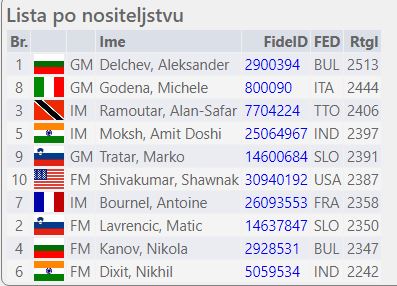

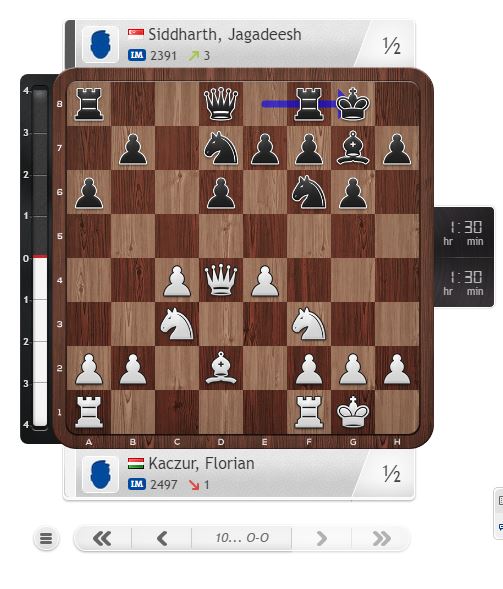

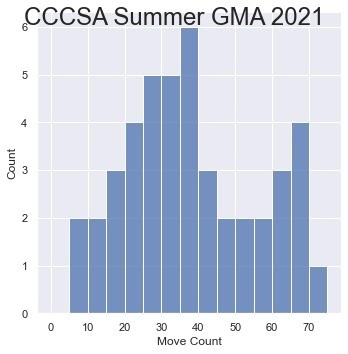
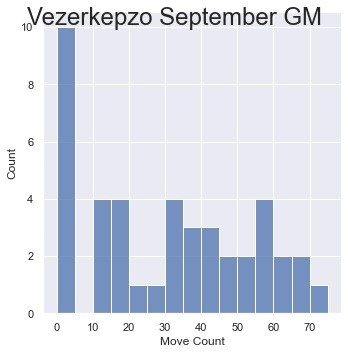
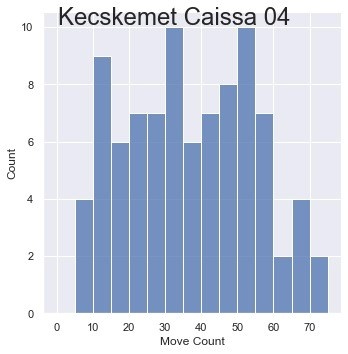
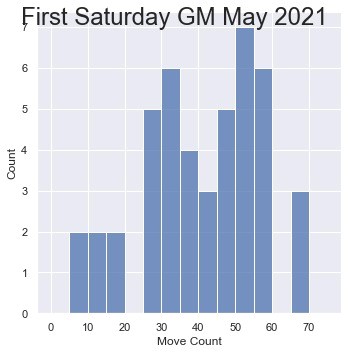
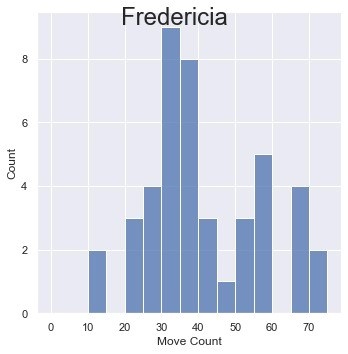
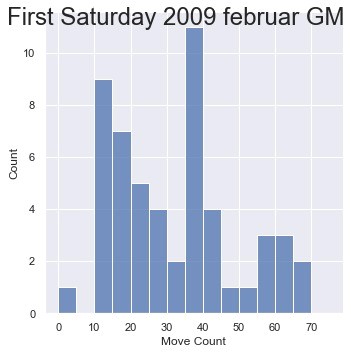
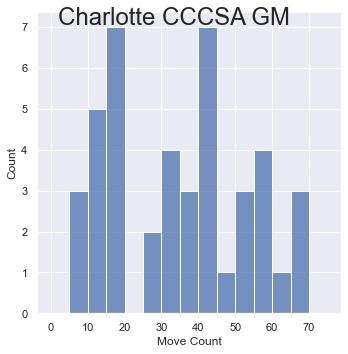
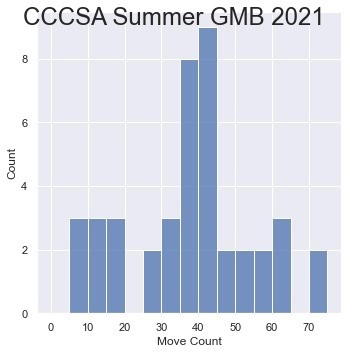
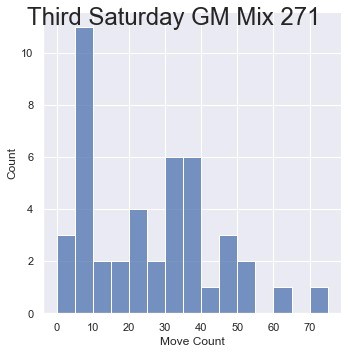
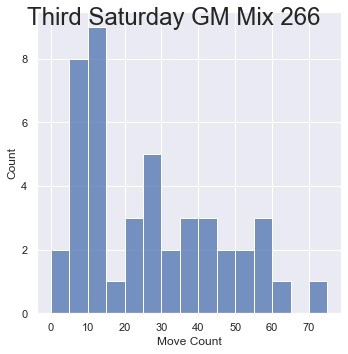
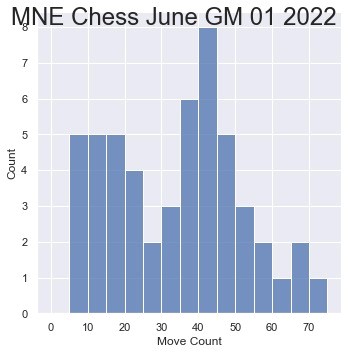
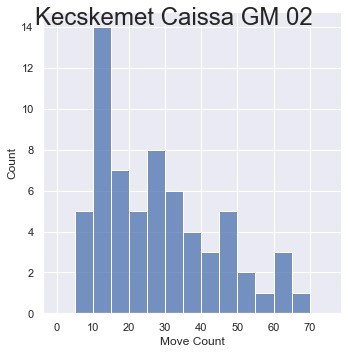

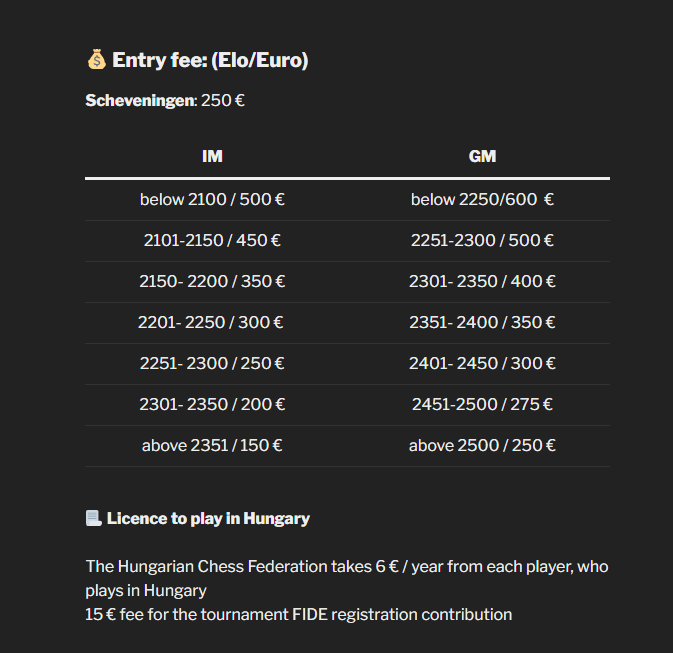
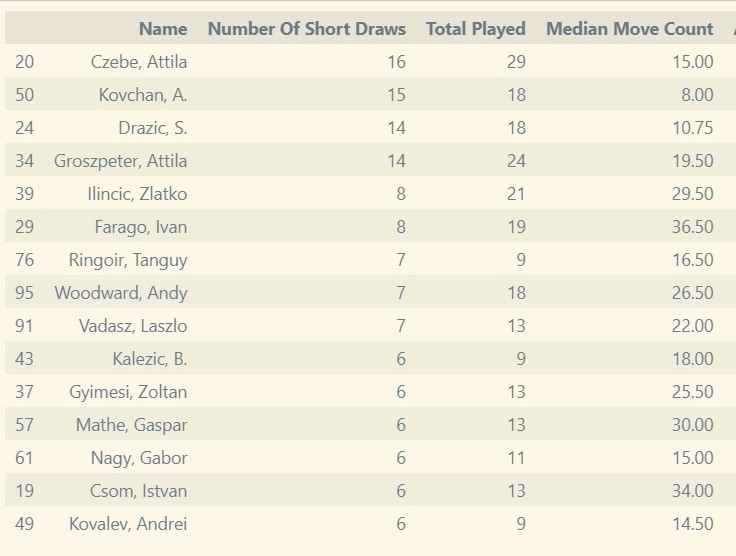
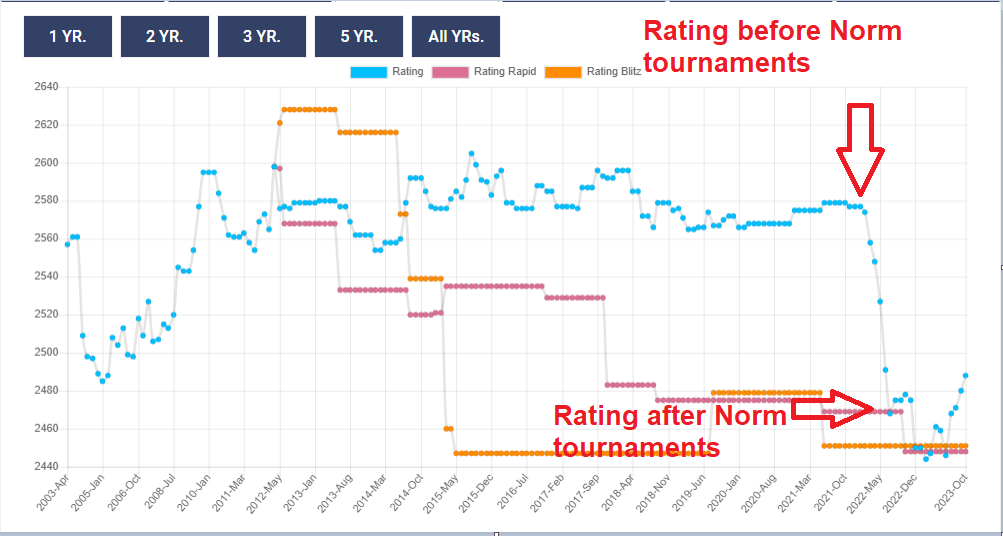
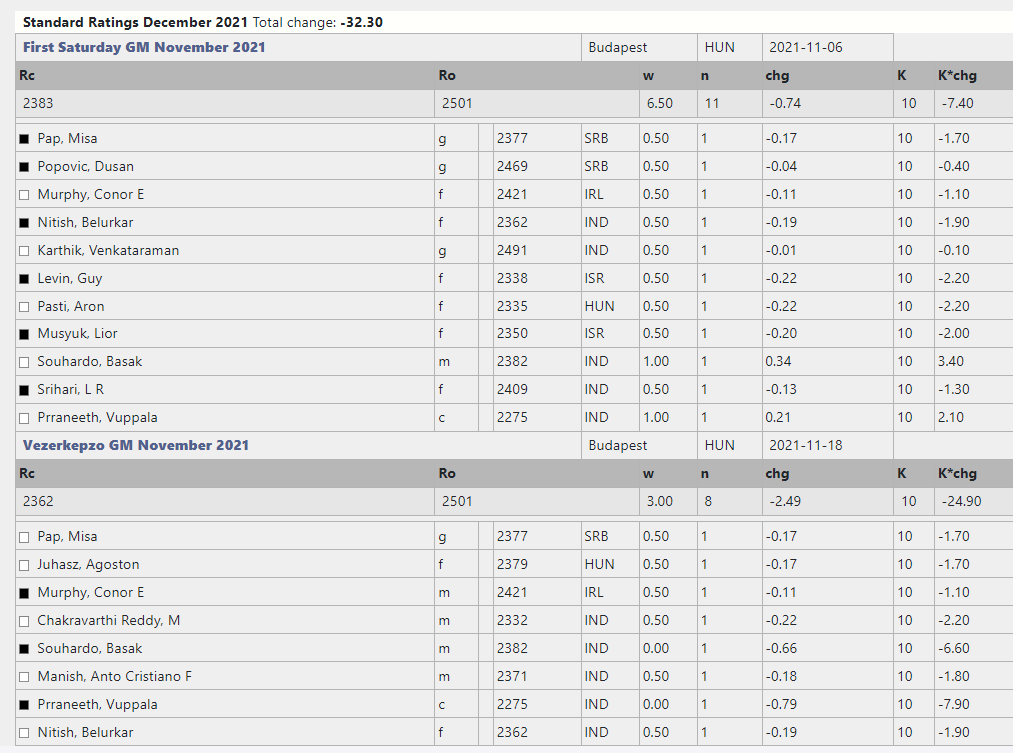

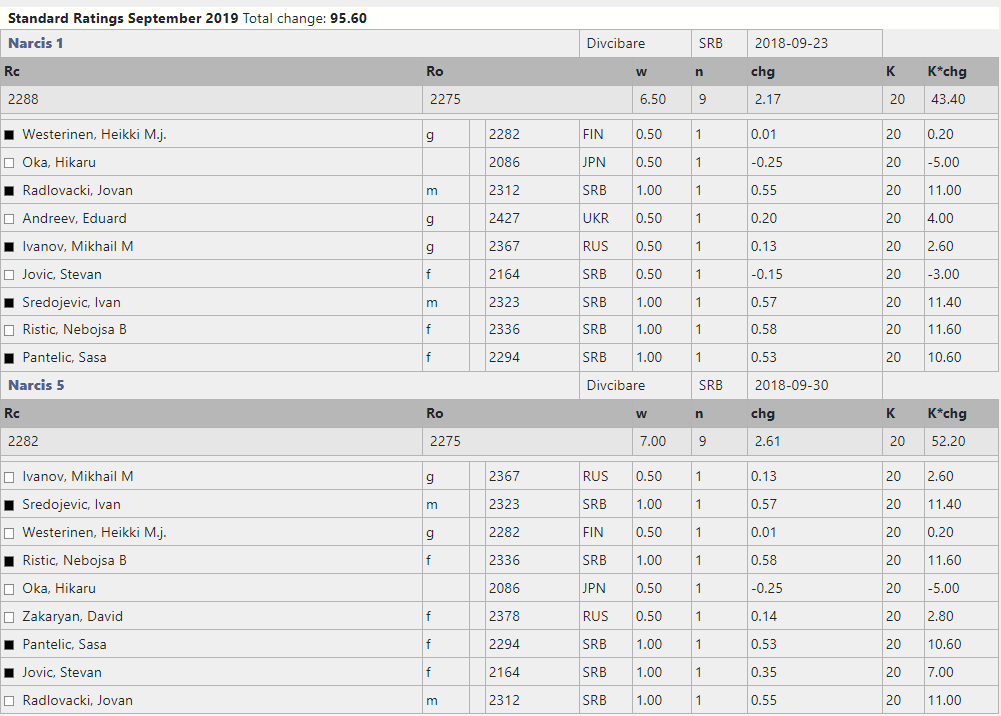

Did you mean “not a must” or “now a must” 🙂
Good article about the real issue. Thanks.
I should be mentioned though that open Swiss tournaments also have „conditions” for titled players to attract other players, and enable norms. So this problem is not unique to norm RR tournaments.
Best regards,
Tomek
A very long article based on nearly zero facts. You can buy a point in any kind of tournament. Roundrobins were the base to achieve norms for a very long time when it was not possible to achieve them in opens.
I played in Budapest a GM round robin where the best participating six players today have a rating average of 2650 (Le, Ragger, Meyer, Braun, Rodstein,, Leon-Hoyos) Only one of them made a norm.
Just bumped into your article – great analysis and very thoughtful! I’d like to comment that Andy W. had several quick draws in the round robin tournaments in Serbia and in Hungary because he was very sick both times (covid in Serbia and a bad cold after soaked in the rain on the way to the hotel in Hungary). Since withdrawing from a round robin tournament was not an option. He had to keep the tournaments going by offering draws when he felt the worst. Both times he couldn’t even get out of the beds to go to the tournament hall for a couple of days. Andy was more disappointed than anyone else to have those quick draws 🙂